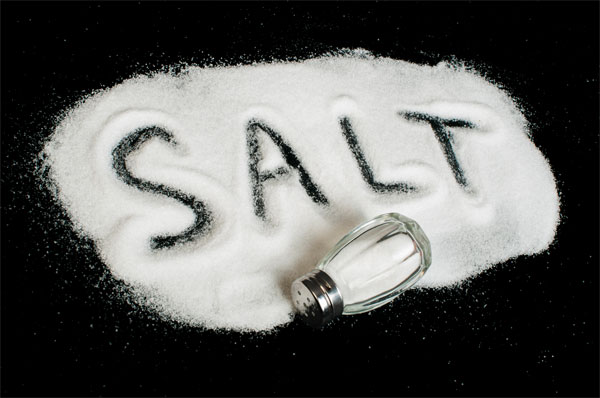Eating too little salt is also harmful to health
Many people have long believed that salt is not beneficial to the body, even harmful, so try to eat as little salt as possible . But according to recent research, people who have a diet with enough salt will have a healthier heart and live longer than those who eat too little salt.
>>>Eating too much salt increases the risk of death
Eating too little salt is also harmful to health
After monitoring for thousands of people for nearly four years, scientists have found that people who eat about 3 to 6 grams of salt a day are less likely to suffer from cardiovascular problems like a muscle attack. heart, stroke or heart failure than people who eat too little or too much salt.
"Our study explores the optimal level of sodium for the human body on a global scale, and we have found that using moderate salt is a way to get a healthy body" - speech of the research leader, Professor Andrew Mente of McMaster University in Ontario, Canada.

According to the study, an average American adult currently consumes about 3.4g of salt a day. However, the US government's current diet guideline advises people to minimize daily salt intake. Accordingly, people between the ages of 14 and 50 should limit their intake of salts to about 2.3g / day, and those aged 51 and older, as well as groups of people at high risk of heart disease (sufferers) High blood pressure, diabetes or kidney disease should reduce the amount of salt absorbed to 1.5 g / day.
"Research has shown that current diet guidelines need to be adjusted, " said Professor Mente. This study is important because it is carried out on a large scale, and learns about the long-term effects of salt on human health. Its results have shown that there are very few Americans - only 4% of participants - whose salt intake is within the limits of government diet guidelines.
Consider the role of salt again
To achieve such results, the team evaluated the health of nearly 102,000 people aged 35 to 70 in 17 different countries, from developed countries to low-income countries. Most participants do not have a history of heart disease, so the results represent the majority of the world's population, not just those at high risk of cardiovascular disease. The report on this issue was published on The New England Journal of Medicine on August 14th.
Each volunteer provided a sample of their urine each morning so that the researchers calculated the sodium and potassium levels excreted within 24 hours of each person, a reliable evidence for calculating the level. absorb these two substances of each person.

The results show that, although people who use too much salt are at higher risk, there is also evidence that using too little salt also leads to health consequences. Several recent studies have also shown a link between poor salt diets and the increased risk of cardiovascular diseases . So we will need more in-depth studies to explain why the rise of health problems goes hand in hand with the decline in salt intake.
The data also showed that people with a diet of more than 1.5 grams of potassium salts were less likely to experience heart problems than those who ate less of these salts. Potassium is able to minimize the effect of sodium salt on blood pressure - Professor Mente said - and he also thinks that the use of more potassium can create a reasonable diet, because in fruits and Vegetables contain a lot of these salts.
Regarding the practical application of this study, Professor Mente said that if you are eating too much sodium salt (more than 6g / day) or high blood pressure, it is best to reduce salt intake as well as the term. Use ready-to-eat foods like bacon, sausage or canned foods. But people who are consuming a moderate amount of salt (about 3–6g of salt per day) may not need to cut down on salt during meals, as even doing so may increase the risk of heart disease.
A large clinical trial is needed to accurately compare the health of the group of people who eat less salt with just enough groups. But while waiting for the results, " In order to have a healthy heart and live longer, instead of focusing only on nutrition, such as limiting the amount of salt, we should work hard to eat and eat. moderation and non-smoking, " said Professor Mente.
- How does eating too much salt harm your body?
- Did you know how to use salt properly?
- 5 absolute things should not be done while eating
- Eating too much salt increases the risk of death
- Little things to know about salt
- Health - what to do 'because of the habit of eating salty and eating light
- Eating a lot of salt makes children get up late
- Eating lots of sushi is harmful to health
- Harmful when abusing grapefruit
- How bad is eating at night?
- 6 basic mistakes in eating and drinking
- Reducing 3 grams of salt can help 92,000 people escape death each year
 Green tea cleans teeth better than mouthwash?
Green tea cleans teeth better than mouthwash? Death kiss: This is why you should not let anyone kiss your baby's lips
Death kiss: This is why you should not let anyone kiss your baby's lips What is salmonellosis?
What is salmonellosis? Caution should be exercised when using aloe vera through eating and drinking
Caution should be exercised when using aloe vera through eating and drinking